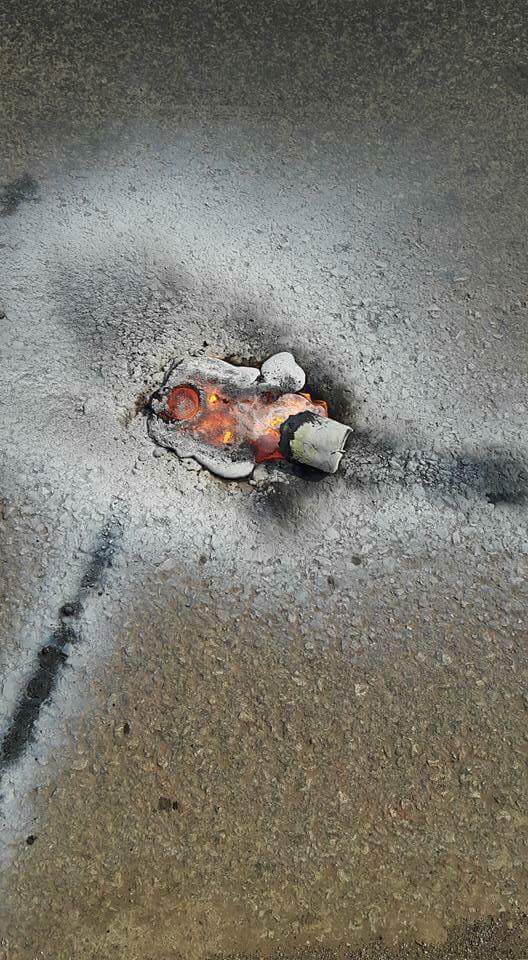
Zaina Erhaim:
' “Within couple of days, they will take the last road connecting Aleppo city to its suburb, Castello,” he said. “I must leave now to make it in.”
In 2012, Mahmoud Rashwani, a 30-year-old activist, had left his home and family in Aleppo after he was arrested and tortured for participating in peaceful demonstrations. On 12 July, he left another family – me and our six-month-old baby – to go back to what is left of Eastern Aleppo. Vegetables and fruits were already running out in the city, so he carried some tomatoes to share with friends, and walked through the middle of the night with two doctors, who infiltrated through the government siege along with him. I couldn’t help feeling abandoned. I was left with the great burden of taking care of a baby on my own. Still at least, I am not being left for another woman, but rather for a siege and a cause.
“I saw a banana today! But I couldn’t catch it. It was running fast in the first-aid car that entered the city,” Mahmoud wrote on 10 August. Among the estimated 300,000 to 400,000 people living on Aleppo’s eastside, Mahmoud hadn’t had any vegetables or fruit for the past month. Aside from lack of fresh food, civilians in Aleppo were suffering shortages of fuel, canned food, eggs, sugar, flour and baby milk. Bakeries have stopped selling bread. Instead, local councils are distributing it to achieve a balance so people will not hoard the precious commodity.
“The shelves of shops were all empty by the fourth week of the siege,” Salah, a media activist living in Aleppo, told me. “The big generators providing electricity to our houses stopped working because they couldn’t find fuel.”
The reasons Salah was drawn back into Aleppo were no different from those that took Mahmoud from us. “Being here will help the besieged civilians - either by documenting what’s happening to them with my camera or providing moral support to them,” he told me.
Although the encircling of Aleppo could be seen coming for months, it still shocked people.
“We were surprised when it happened, in spite of speaking about it for so long,” said Samar, director of counselling and social support in the Space Of Hope organisation, a local development group working inside the city. When the siege began, they ramped up a household farming project run by activists who volunteered to find and distribute seeds of basic vegetables to families so they could work towards food self-sufficiency.
Like other organisations in Aleppo, Space of Hope didn’t stop providing services and running child educational centres during the siege. “To give the people a sense that life hasn’t stopped, we are carrying on, and so are our projects,” Samar told me.
The main challenge the organisation has faced is the lack of fuel and the sudden halt of transportation. Even amid blazing heat and skies bristling with prowling jets, walking is the only available option. Public coordination has shown its worst face over the past month. Some traders hid food to sell it later at even higher prices. But others kept prices the same, telling buyers, “We live and die together”. Some activists turned their cars into free public taxis to help those struggling to move around the city.
Samar hasn’t seen her 19- and 12-year-old daughters for four months, and when she finally managed to get permission to cross the Turkish border to see them, the road to Aleppo was cut.
“I was so desperate and sad that I couldn’t hold my tears and stopped speaking to them, fearing that I might collapse,” she said.
Her shaky voice faded as we talked, then she continued: “When the rebels opened the road, I felt the ultimate happiness, more than when I held Momena (one of her daughters) in my arms for the first time. I really can't describe it to you.”
Amid the siege and before the rebel counter-offensive, public spirits hit a low. People resigned themselves to a destiny like that of Madaya, a city that has suffered for years from siege and hunger.
As the siege was broken, Salah said, “the public mood lifted dramatically, people went down to the streets offering any kind of help, they all started burning tyres creating a black cloud to block the [Russian and Syrian] air force, applying a homemade no-fly-zone."
It didn’t offer much protection though. Bombing during the siege and even now is extensive, mostly targeting the road through which people can flee the besieged city.
“This is how humanitarian the corridors suggested by the regime are,” Berbers Meshaal, a group leader of the While Helmets (civil defence force), told me.
Berbers lives with his wife in the city, and is awaiting the arrival of more supplies, while Salah, Samar and Mahmoud eye the road, a couple of metres of asphalt that separates them from their families, some for years in a recurrent scenario for Syrians as the UN stands by worrying, only worrying.'





.png)
